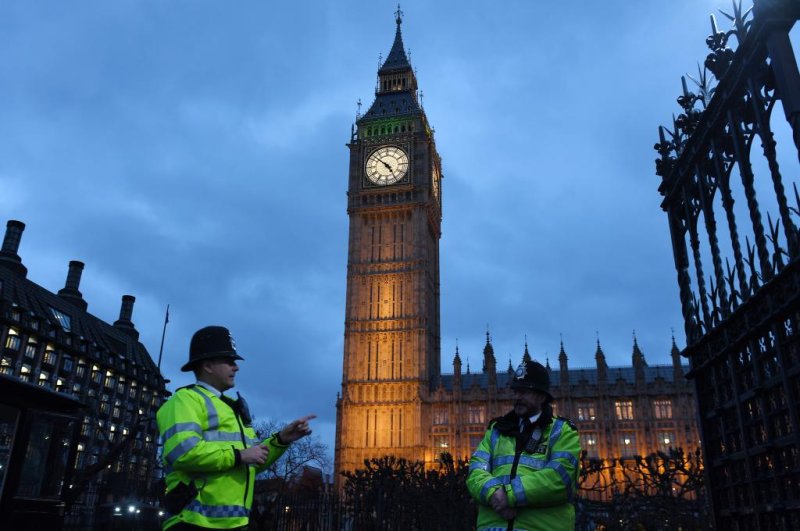British police patrol outside Parliament in London on February 1, 2017, as MPs wrapped up two days of debate on whether to start Britain's exit from the European Union to approve a bill giving Prime Minister Theresa May clearance to do so. Photo by Andy Rain/EPA
Feb. 1 (UPI) -- A bill allowing British Prime Minister Theresa May to start negotiating how the country will exit the European Union was overwhelmingly passed by the members of parliament on Wednesday.
British MPs approved the European Union Bill by a vote of 498 to 114, following two days of contentious debate on whether to authorize May to start ending Britain's membership in the E.U.
The bill will now head to the House of Lords, which revises laws passed by the Parliament's lower chamber -- and unlike the House of Lords is elected to office. While there are opponents of Brexit there, the bill is expected to be approved again before one more vote among the MPs.
May did not want to let Parliament vote on Brexit after voters narrowly approved the measure, she was ordered to by the British Supreme Court. May had already set a March 30 deadline to start the withdrawal and did not want to slow the process, but members of the Labour party howled about Parliament being involved in Brexit almost immediately after voters opted for it.
Most of Labour was against Brexit, but with broad voter support in many their districts the MPs followed their constituent's lead and gave May the power to move forward.
"This is obviously a difficult decision. I wish the result had gone the other way -- I campaigned passionately for that -- but as democrats, we in the Labour Party have to accept the result," said Keir Starmer, a Labour party member responsible for handling Brexit. "It follows that the prime minister should not be blocked from starting the Article 50 negotiations."
As the bill moves forward, many MPs already are looking ahead to negotiating the actual exit, with Labour party leader Jeremy Corbyn saying "the battle of the week ahead is to shape Brexit negotiations to put jobs, living standards and accountability center stage."
Negotiations for Britain to leave the E.U. are expected to last as long as two years, but some experts say a workable trade deal may not be reached for as long as a decade. The two sides also will have to negotiate outstanding financial liabilities Britain has to the E.U., which could possibly land between $43 billion and $65 billion.
"It's a negotiation on the scale that we haven't experienced ever, certainly not since the Second World War," Ivan Rogers, the former permanent representative of Britain to the E.U., told The New York Times.















